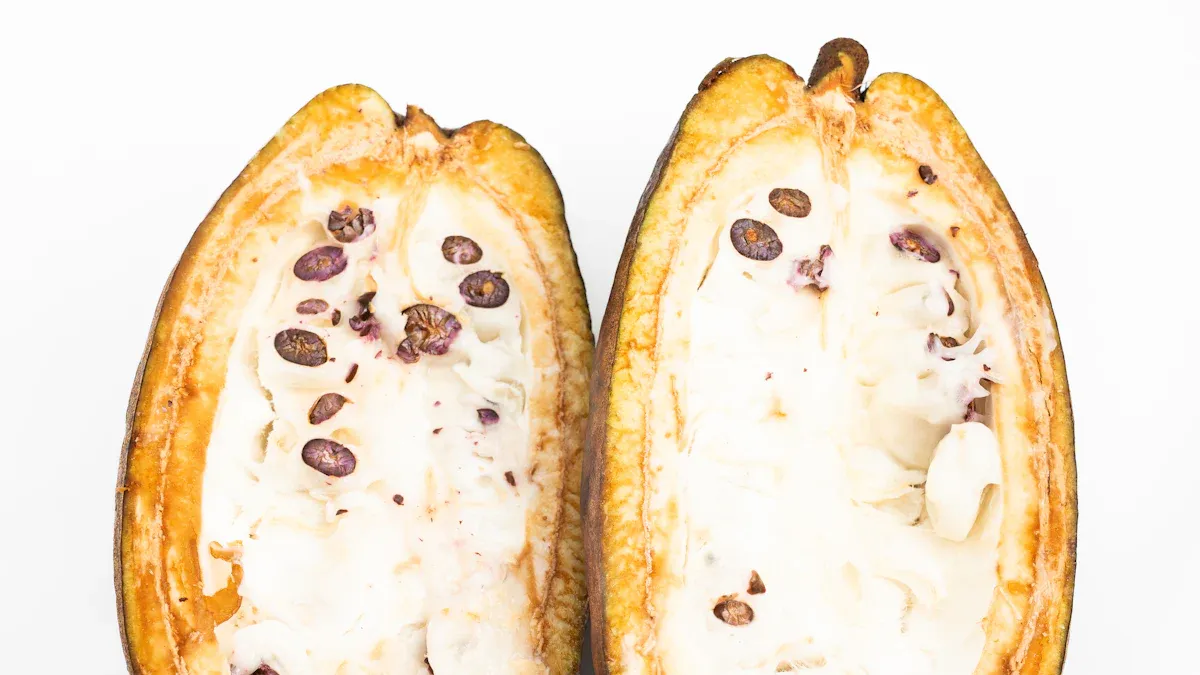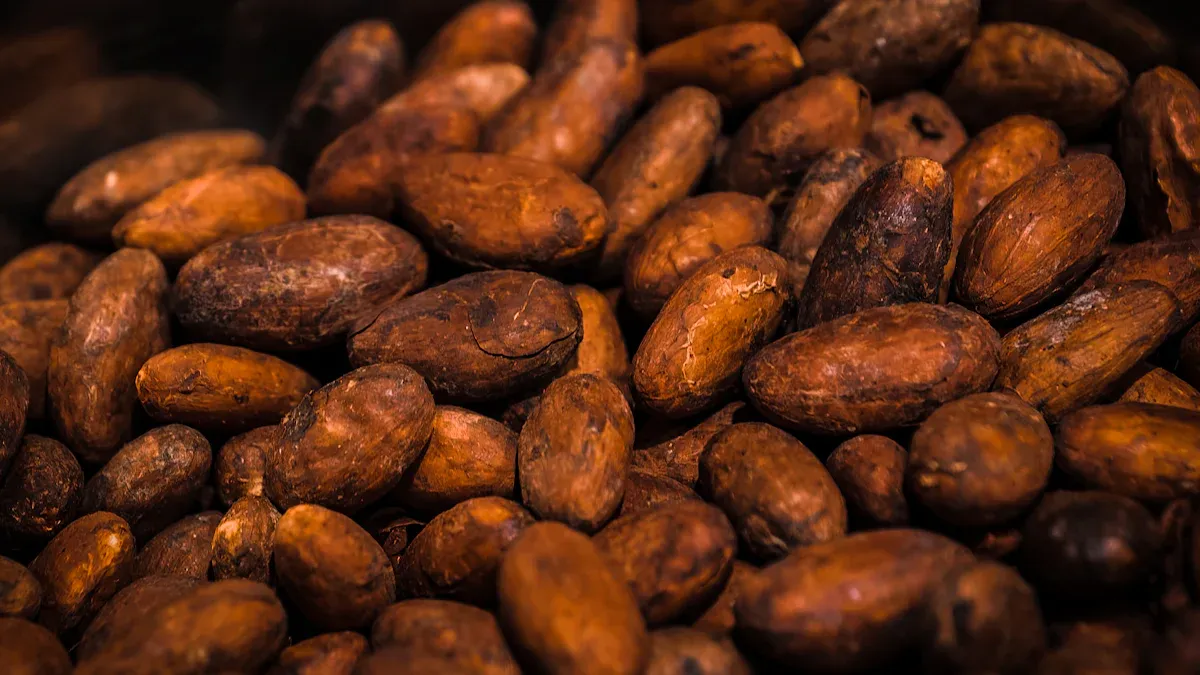
Cocoa nibs are the purest form of chocolate. You can think of them as a superfood. These raw cacao pieces offer remarkable benefits. They are rich in fiber and powerful antioxidants. This article explores the comprehensive cocoa nibs health benefits. The market for cacao nibs is growing, with an 8.1% annual growth rate projected from 2025 to 2032. This reflects increasing consumer interest in their health advantages. You will discover the many benefits these tiny cacao powerhouses provide.
Key Takeaways
Cocoa nibs are pure, crushed cacao beans. They are full of fiber and strong antioxidants.
These nibs help your heart and brain stay healthy. They also help control blood sugar.
Cocoa nibs have no added sugar. This makes them a healthier choice than most chocolates.
You can add cocoa nibs to many foods. Try them in oatmeal, yogurt, or baked goods.
What Are Cocoa Nibs

Cocoa nibs are simply crushed cocoa beans. Think of them as chocolate in its purest, most natural form. They are minimally processed. This means they keep most of their original nutrients. You get a raw and pure product.
From Bean to Nibs
Making cocoa nibs starts with the cacao bean. First, workers harvest the beans from the cacao tree. Then, they ferment and dry these beans. After drying, the beans go through a roasting process. This step is important. It helps develop the distinct chocolate flavor you know. Roasting times vary. They can range from 15 to 90 minutes. This depends on the flavor desired. Manufacturers use lower and slower temperatures for roasting. This is gentler than coffee roasting.
Next comes cracking and winnowing. This process separates the outer shell from the inner kernel. The dehulled kernel is the cacao nib. The shell becomes the husk. This simple process gives you raw cacao nibs. They are ready for use.
Flavor and Versatility
Cocoa nibs have an intense, deep chocolate flavor. They are slightly bitter. This is because they contain no added sugar. This makes them very different from processed chocolate bars. Those often have lots of sugar and other ingredients. You get the true taste of cacao.
Their unique flavor and texture make them versatile. You can add them to many dishes. They provide a satisfying crunch. You can use them in sweet or savory recipes. They are a great way to enjoy the benefits of cacao without extra sweetness.
Cacao Nibs Nutrition: A High-Fiber Superfood
You hold a true nutritional powerhouse when you pick up cacao nibs. These tiny pieces of cacao offer a rich profile of macronutrients and micronutrients. They are a high-fiber superfood that can boost your energy. Understanding the cacao nibs nutrition helps you appreciate their value.
Here is a look at the general macronutrient profile of cacao nibs per 100 grams:
Macronutrient | Amount (per 100g) |
|---|---|
Calories | 625 kcal |
Protein | 10.7 g |
Fat | 53.6 g |
Fiber | 17.9 g |
Sugar | 3.6 g |
Fiber for Digestion and Satiety
Cacao nibs are an excellent source of fiber. This nutrient is crucial for your healthy digestion. For example, two tablespoons (14 grams) of cacao nibs give you 4 grams of fiber. One ounce of cacao nibs provides 9 grams of fiber. This high fiber content helps you feel full longer. It supports satiety.
The fiber in cacao also works with other compounds to support your gut health.
Cocoa Polyphenols: About 95% of the polyphenols in cacao reach your colon. Gut bacteria break them down. These polyphenols act like prebiotics. They help good bacteria grow, such as lactobacilli and bifidobacteria. They also stop harmful bacteria from growing. This includes E. coli and Salmonella.
Theobromine: This compound also helps your gut. It changes the types of microbes in your gut. It increases butyrate production, which is good for your gut lining.
Fiber: The fiber itself feeds your gut bacteria. This further helps your gut microbiome stay balanced.
These combined benefits lead to better overall healthy digestion.
Antioxidant Power: Flavonoids and Polyphenols
Cacao nibs are packed with powerful antioxidants. These compounds protect your body’s cells from damage. They help reduce oxidative stress and inflammation. The main types of flavonoid antioxidants and polyphenol antioxidants in cacao are:
Catechins: These make up about 37% of the polyphenol content. The most common one is (-)-epicatechin.
Anthocyanidins: These are about 4% of the content.
Proanthocyanidins: These are the most abundant, making up about 58%. They are complex chains of other flavonoids.
These antioxidants give cacao nibs a very high ORAC (Oxygen Radical Absorbance Capacity) value. This measures how well a food fights free radicals.
Food Item | ORAC Value (per 100g) |
|---|---|
Raw cocoa powder | 95,500 |
Raw cacao nibs | 62,100 |
Roasted cocoa powder | 26,000 |
Organic Goji Berries | 25,300 |
Acai Berries | 18,500 |
Dark Chocolate | 13,120 |
Milk Chocolate | 6,740 |
Prunes | 5,770 |
Raisins | 2,830 |
Blueberries | 2,400 |

As you can see, raw cacao nibs have significantly more antioxidants than many other superfoods. This makes them a top choice for boosting your antioxidant intake.
Essential Vitamins and Minerals
Beyond fiber and antioxidants, cacao nibs provide important vitamins and minerals. These nutrients support many body functions.
Cacao nibs are an excellent source of:
Iron
Magnesium
Potassium
For example, one tablespoon (8g) of cacao nibs gives you:
Mineral | Amount Per Serving (1 Tbsp / 8g) | % Daily Value |
|---|---|---|
Calcium | 10mg | 0% |
Iron | 2.3mg | 15% |
Potassium | 90mg | 2% |
You also get a small amount of Vitamin D from cacao nibs. One serving provides 0.4 mcg, which is 2% of your daily value. These minerals and vitamins contribute to your overall health.
Healthy Fats and Protein
Cacao nibs contain healthy fats. These fats are important for energy and nutrient absorption. The main fatty acids found in cacao are:
Palmitic acid
Stearic acid
Oleic acid
While cacao nibs are higher in fat, they also offer a good amount of protein. Protein is essential for building and repairing tissues. The combination of healthy fats and protein makes cacao a satisfying and energy-rich food. You get sustained energy from these components.
Cocoa Nibs Health Benefits

You already know cacao nibs are packed with nutrients. Now, let’s explore the specific cocoa nibs health benefits. These tiny powerhouses do more than just taste good. They actively support your body’s well-being.
Heart Health Support
Your heart works hard every day. Cocoa nibs can help improve heart health. They contain powerful antioxidants called flavonoids. These compounds protect your heart. They help reduce cell damage. This protection can prevent diseases like heart disease.
Studies show that regular cocoa consumption positively affects cholesterol levels. For example, a trial gave high-risk volunteers 40g of cocoa powder daily. This group saw a significant increase in “good” HDL cholesterol. Their “bad” oxidized LDL levels decreased. Another study with 160 people also found similar benefits. Consuming high-polyphenolic cocoa powder reduced LDL cholesterol. It also raised HDL cholesterol. These findings mean the polyphenols in cacao can improve your heart health. They help keep your blood vessels healthy.
Brain Function Enhancement
Cocoa nibs also offer great benefits for your brain. They contain flavonoids. These compounds improve cognitive function. They can reduce the risk of age-related mental decline. Flavonoids may also boost certain neurotransmitters in your brain. This can improve your mood. It might even help with symptoms of depression and anxiety.
Cacao beans are rich in flavanols. These plant chemicals protect against oxidative stress. They also have anti-inflammatory and antioxidant properties. These properties directly influence brain health. Flavanols improve blood flow to your brain. They help prevent blood clots. They also fight cell damage. Lab studies show flavanols help brain cells connect and survive. They protect brain cells from toxins and inflammation.
Research supports cacao’s role in neuroprotection. A diet rich in polyphenols, including cocoa, helped adult mice. It prevented age-related cognitive problems. It also helped with Alzheimer’s disease models. Cocoa flavonoids help neurons survive. They improve brain blood flow. Epicatechin, a main flavonoid in cocoa, crosses the blood-brain barrier. This means it acts directly on your brain. It offers neuroprotection. High chocolate consumers had a 29% lower stroke risk. This shows the significant brain benefits. Most research shows cocoa flavanols improve cognitive function in young adults. This suggests cocoa can help prevent neurodegenerative diseases.
Blood Sugar Regulation
Maintaining healthy blood sugar levels is vital. Cocoa nibs can help with blood sugar control. Human studies show cocoa consumption helps regulate blood sugar. It improves insulin sensitivity. Regular intake of high-polyphenol dark chocolate reduces fasting blood sugar levels. It also improves long-term blood sugar control.
Cacao nibs are rich in antioxidants. These antioxidants reduce oxidative stress and inflammation. This offers potential benefits for diabetes prevention. Animal studies show cocoa flavanols can ease insulin resistance. They influence insulin signaling. They reduce inflammation. Cocoa flavanols improve insulin sensitivity through several ways. They regulate carbohydrate absorption in your gut. They protect pancreatic cells. They enhance insulin secretion. They also improve insulin sensitivity in other tissues. They prevent oxidative stress and inflammation. These mechanisms all contribute to better blood sugar control.
Anti-Inflammatory Effects
Inflammation is a natural body response. But chronic inflammation can cause many health problems. Cocoa nibs have anti-inflammatory properties. Flavonoids in cacao nibs help reduce inflammation. These properties can lower the risk of chronic inflammatory conditions. This includes conditions like arthritis. They also help with inflammatory bowel disease. The anti-inflammatory effects of cacao can lower risks for cancer, heart disease, and diabetes.
Immune System Boost
A strong immune system keeps you healthy. Cocoa nibs can help boost immune health. They contain important nutrients that support your immune system. These include iron, zinc, and selenium. Iron helps your immune cells develop. Zinc is crucial for immune cell function. Selenium protects your immune cells from damage. These minerals work together to strengthen your body’s defenses. They help your immune system fight off illness.
Nibs vs. Other Chocolate
You have many choices when you want to enjoy chocolate. Understanding the differences between cocoa nibs and other chocolate products helps you make informed decisions. Cocoa nibs stand out because they are minimally processed. This means they keep more of their natural goodness.
Raw Advantage: Nutrient Retention
When you choose cacao nibs, you pick a product very close to its natural state. Manufacturers simply crush and ferment the cacao beans. This minimal processing helps retain vital nutrients. Other chocolate products often undergo extensive processing. This can strip away beneficial compounds. Nibs keep their high levels of antioxidants and fiber. You get the full nutritional power of the cacao bean.
Comparison to Cocoa Powder
You might wonder how cacao nibs compare to cocoa powder. Both come from the cacao bean. However, their fiber content differs. Look at this table:
Product | Fiber Content (per 1 ounce / 28 grams) |
|---|---|
Unsweetened Cocoa Powder | 9 grams |
Unsweetened Cacao Nibs | 3 grams |
Unsweetened cocoa powder has more fiber per ounce. But cacao nibs still offer a good amount of fiber. They also provide healthy fats and a unique texture. Both are excellent sources of antioxidants. The key difference lies in their form and how you use them.
Avoiding Added Sugars
One of the biggest advantages of cacao nibs is their lack of added sugar. Most processed chocolate bars contain a lot of sugar, but cacao nibs do not. This means you get all the natural antioxidants without the extra sweetness. For example, many commercially available cacao nibs contain zero sugar:
Nutrient | Amount per 30g serving |
|---|---|
Total Sugars | 0g |
Added Sugars | 0g |
The product description for Mababu, Tanzania Roasted Cacao Nibs explicitly states that these nibs contain ‘zero sugar’. You avoid unnecessary sugars while still getting beneficial antioxidants. This makes them a healthier choice for your diet.
Using Cocoa Nibs
You can easily incorporate cocoa nibs into your daily diet. These versatile pieces of pure chocolate enhance many meals. They add flavor, texture, and a powerful nutritional boost.
Breakfast Additions
Start your day with a healthy boost. Sprinkle cocoa nibs over your morning oatmeal or cereal. You can stir them into your favorite yogurt. Blend them into your fruit smoothies for an extra layer of flavor and nutrition. They provide a satisfying crunch. They also give a rich, chocolatey taste without any added sugar. This simple addition boosts your morning meal with fiber and antioxidants from cacao.
Baking and Desserts
Cocoa nibs are an excellent ingredient for your baking projects. Use them in cookies, muffins, or homemade granola bars. They add a deep, complex chocolate flavor. They also provide a pleasant, slightly bitter texture. Try them as a topping for ice cream, puddings, or fruit salads. They make a healthy and flavorful addition to almost any sweet treat.
Savory Dishes
Do not limit cocoa nibs to just sweet recipes. They can add a unique and sophisticated element to savory dishes. Sprinkle them on salads for an unexpected crunch and earthy note. You can also use them in rubs for roasted meats or poultry. Some creative chefs even add them to chili or mole sauces. Their distinct, slightly bitter taste complements many savory flavors. This adds depth and complexity to your cooking.
Simple Snacking
Cocoa nibs make a fantastic and convenient snack on their own. You can eat them plain for a quick energy boost during your day. Mix them with nuts, seeds, and dried fruit for a homemade trail mix. They offer a simple way to get your daily dose of antioxidants from cacao. Keep a small bag with you for a healthy and satisfying treat. Enjoy the pure taste of cacao anytime you need a pick-me-up.
Considerations and Tips
You have learned about the many benefits of cocoa nibs. Now, you should also know a few important considerations. These tips help you enjoy cocoa nibs safely and effectively.
Caffeine Content
Cocoa nibs contain natural stimulants. One of these is caffeine. You should know this, especially if you are sensitive to caffeine. A single tablespoon of cacao nibs can contain about 14mg of caffeine. A teaspoon (3 grams) has around 10.4 mg. This is less than a cup of coffee. Still, you should be aware of your total daily caffeine intake.
Sourcing Quality Nibs
Choosing good quality cocoa nibs is important. You want to get the most benefits. Look for certifications on the packaging. These labels tell you about the product’s quality and how it was made.
Organic: This means farmers grew the cacao without harmful pesticides.
Fair Trade: This ensures farmers received fair wages for their work.
Kosher: This certification means the product meets specific dietary standards.
Regenerative Organic Certified®: This shows the product comes from farming practices that improve soil health. These certifications help you choose ethically sourced and high-quality nibs.
Moderation is Key
Even with all their benefits, you should eat cocoa nibs in moderation. For optimal health benefits, aim for 1 to 3 tablespoons (15-45 grams) each day. This amount gives you plenty of antioxidants and nutrients. It does not add too many calories.
You should also know about potential allergies. Cacao allergies are rare. However, some people can have severe reactions. These reactions happen because of specific proteins in cacao. Symptoms can include hives (urticaria), swelling of deeper skin layers (angioedema), or even life-threatening anaphylaxis with difficulty breathing. Other symptoms might include nausea, vomiting, or wheezing. If you have a family history of allergies or conditions like eczema, you might be more prone to a cacao allergy. Cross-reactivity can also occur with other foods like nuts. Always be careful if you notice any unusual symptoms after eating cacao.
You now understand the remarkable cocoa nibs health benefits. These tiny pieces are a true nutrient-dense superfood. They offer significant fiber and powerful antioxidants, contributing greatly to your overall health. You will discover many benefits from integrating cocoa nibs into your diet. Embrace the cocoa nibs health benefits for a delicious and healthy boost. This superfood provides essential fiber and potent antioxidants. Raw chocolate has a bright future in healthy eating.
FAQ
What are the primary health benefits of cocoa nibs?
Cocoa nibs offer significant health advantages. They provide high amounts of fiber, aiding digestion and satiety. You also get powerful antioxidants, like flavonoids, which protect your cells. These compounds support heart health, brain function, and reduce inflammation.
What distinguishes cocoa nibs from processed chocolate?
Cocoa nibs are minimally processed, raw cacao beans. They contain no added sugar. Processed chocolate often includes significant amounts of sugar, dairy, and other additives. You get the pure, intense flavor and full nutritional profile of cacao with nibs.
What is the best way to store cocoa nibs to maintain freshness?
Store your cocoa nibs in an airtight container. Keep them in a cool, dark, and dry place. This prevents moisture and preserves their flavor and nutritional quality. You can also refrigerate or freeze them for longer storage.
What is a recommended daily serving size for cocoa nibs?
You can enjoy 1 to 3 tablespoons (15-45 grams) of cocoa nibs daily. This amount provides ample antioxidants and fiber. It also helps you avoid excessive calorie intake. Adjust this based on your dietary needs and preferences.

